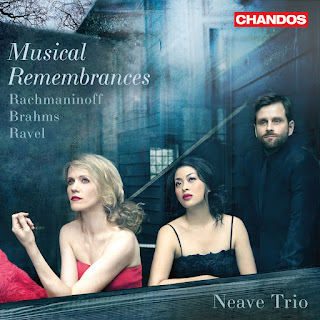courtesy of Jensen Artists
I first become aware of the Neave Trio, whose members are violinist Anna Williams, cellist Mikhail Veselov, and pianist Eri Nakamura, when they released their second album, devoted entirely to the music of Astor Piazzolla in December of 2018. On the basis of repertoire alone, I made it a point to keep up to date with subsequence released. However, Neave turned out to be just as significant for me with the onset of the COVID pandemic.
Serving as Faculty Ensemble-in-Residence at the Longy School of Music of Bard College, which is located in Cambridge, Massachusetts, the trio presented its first live-stream concert in October of 2020, which was followed by subsequent streamed recitals; and I did my best to try to keep up with them all. According to my records, they kept at it through May of 2021, with imaginative repertoire based on both recordings and recitals. Now that we are emerging from pandemic conditions, Chandos will be releasing Neave’s latest album this coming Friday; and, as will probably be expected, Amazon.com has created a Web page for processing pre-orders.
The title of the album is Musical Remembrances, and the “program” of the release offers several perspectives on memory and nostalgia. The most evident of those perspectives in the Opus 8 trio by Johannes Brahms. As the number suggests, this is one of the composer’s earliest efforts, first published in 1854 after several earlier attempts to write for this genre of chamber music. However, much later in life (1889), Brahms totally overhauled his score; and that is the version we are now most likely to encounter. (Unless I am mistaken, I have only one recording of the 1854 version.)
The Brahms trio is preceded by Sergei Rachmaninoff’s 1892 piano, the first of his two “Trio élégiaque” compositions, which were completed in 1892 and 1893, respectively. The second trio was composed after the death of Pyotr Ilyich Tchaikovsky; but both trios can be viewed as a “response” to the “call” of Tchaikovsky’s only piano trio, his Opus 50 in A minor. The album then concludes with Maurice Ravel’s only piano trio, composed in 1914.
Prior to World War I (which began while Ravel was completing his trio), Ravel had “responded” to the “call” of “historical” influences. This was evident in his piano compositions “Menuet antique” and the Le Tombeau de Couperin suite. In the trio itself, he structured the third movement around the repeated bass line of a passacaglia. (On the other hand, the second movement of the trio takes its title, “Pantoum,” from a Malaysian verse form, which would have been traditional in Malaysia but novel in France.)
In spite of their choice of title, Neave does not try to emphasize the nostalgic influences behind any of these three compositions. Their priority is fidelity to all of the marks on paper, after which the group seems to have sought out a set of dispositions for giving each selection its own expressive interpretation. As a result, while all three of the selections will probably be familiar to most chamber music lovers, the freshness of Neave’s approaches to interpretation make this a highly satisfying album.


No comments:
Post a Comment